Do you want to know what the legal drinking age is in Spain so you can make the most of your holiday and know if you can drink the delicious Spanish wine or vermouth? You’ve come to the right location; we have the information!
Spain produces some of the world’s best wine, beer, and – our fave – Spanish vermouth, and many of the best things to do in Spain include alcohol. It’s also a great Spanish memento! Locals are even observed drinking wine or beer during their lunch break!
Spain’s legal drinking age is 18, which is significantly lower than the United States. And, unlike in the United States, Spain’s drinking age does not vary.
Caleb and I have been to Spain numerous times, and drinking their delicious alcoholic beverages is one of our favorite parts of our four-day itinerary in Madrid, so we know a thing or two about Spanish laws and drinking culture!
In this post, we’ll teach you all you need to know about the legal drinking age in Spain, the drinking culture, alcohol legislation, what happens if you break the drinking rules, and even our favorite beverages and cultural recommendations to help you make the most of your Spanish vacation!

What Is Spain’s Legal Drinking Age?
Spain’s legal drinking age is 18 years old. This applies whether you’re drinking or seeking to obtain alcohol. In Spain, you must be at least 18 years old to do either of these.
This is true regardless of whatever city or area of the country you are in. In Barcelona, Madrid, and Mallorca, the legal drinking age is 18.
The legal drinking age was originally set at 16, however, restrictions began to change in 1991 and were fully implemented by 2009. Praise the Lord for this, because can you imagine going on a romantic trip with a group of inebriated 16-year-olds? Thank you very much.
In Europe, the legal drinking age is 18 years old.
Most European countries have the same legal drinking age as Spain: eighteen years old.
There are, nevertheless, significant variances throughout Europe:
- In Belgium, Denmark, and Germany, you can purchase alcohol with less than 1.2% distilled alcohol at the age of 16 and more than that at the age of 18.
- To purchase anything stronger than 3.5% alcohol in Sweden, you must be at least 20 years old.
- In Cyprus and Malta, you can buy any type of alcohol at the age of 17.
- In Luxembourg, you can purchase alcohol at the age of 16.
The Legal Drinking Ages in Spain and the United States
The primary distinction between Spain’s and the United States’ legal drinking ages is that in the United States, you must be 21 to purchase or consume alcohol. In Spain, you have to be at least 18 years old.
As a result, countries like Spain are popular for events like spring break (which is why we don’t recommend visiting at this time if you’re looking for a wonderful, romantic couples vacation!)
The National Minimum Drinking Age Act of 1984 established the legal drinking age in the United States at 21 years old to encourage young people to be more responsible with alcohol. For similar reasons, Spain increased the legal drinking age from 16 to 18.
Both countries have laws covering the purchase, sale, and serving of alcohol to minors, as well as public drinking, open containers, and driving while inebriated. Both countries require you to show your ID if asked, but we’ve learned that we never get carded in Spain, although we do all the time in the US (which always makes us pleased since who doesn’t want to look to be in their twenties?).
Returning Alcohol from Spain to the United States
When you return from your vacation, we guarantee you’ll want to bring some delicious Spanish wine or Vermouth with you. We don’t want you to lose it, so here’s what you need to know:
If you do not wish to pay duty on your alcohol, you may bring one small bottle per person back into the United States (as long as you are 21).
There is no legal limit on the amount of alcohol you may bring back for personal enjoyment, although large volumes may get you detected.
The Federal Aviation Administration, on the other hand, restricts the amount of alcohol that may be brought on an airplane to 5 liters of unopened alcohol per passenger if the alcohol content is between 24% and 70%. You can bring more if the proportion is less than 24%. Anything exceeding one liter per person will be taxed by customs.
Remember that different states have different restrictions about how much alcohol you may bring back if you live in that state, so do your research. This often does not apply if you are simply traveling through that state, such as during a layover.
Duty-free: When exiting the airport in Spain, you may always buy alcohol duty-free. But bear in mind that this just means you won’t have to pay alcohol taxes in Spain. If you bring back more than one liter per person, you will still be required to pay duty in the United States.
Spain’s Drinking Culture
Alcohol use in Spain is significantly more relaxed, comfortable, and normal than in the United States, and people are much more casual about it, particularly when visiting some of the islands such as Mallorca. It is fairly uncommon to see people having a couple of beers or glasses of wine with their lunch, especially if it is a business day and they are taking a (long) lunch break. Isn’t this incredible?
We’ve noticed that Spaniards dine out more than Americans (perhaps because the cost of food/drinks is much lower), therefore going out for beer, wine, and cocktails at night is fairly common. A glass of local beer or wine is sometimes cheaper than a can of Coke!
You’d be a fool not to take advantage of this, especially because Spain produces some of the world’s best wines! We prefer Spanish wine over the popular California wine in the United States.
We learned that beer is the “fancier” drink in Spain, whereas wine is “less fancy.” This is not true in the United States.
Spain, like the United States, has issues with underage drinking. In Spain, drinking usually begins at the age of 13, and 75% of people aged 14 to 18 have used alcohol at some point in their life.
When you visit large towns like Madrid, Barcelona, or Ibiza, you will notice that the lovely bars stay up till late since Spain is a party country.
If you just order a drink at a bar in some locations, like Andalusia or less touristy areas, you may find that you are given a little tapa for free as a consequence. This was not common in large cities like Madrid or Barcelona, so it was a wonderful surprise when it did occur!
Alcohol Consumption Regulations in Spain
Public Consumption of Alcohol
When walking through the streets of Spain, you may come across something called a “botellón” (“big bottle” in English). To save money, a group of young people meets with loud music and exchanges beverages in public places.
Botellón is prohibited, and certain limitations have been implemented, including the impossibility of purchasing alcohol in stores after 10 p.m. However, this does not preclude the botellón or the purchase of alcohol after the age of 10. Some companies may sell it to you after 10 p.m., but it is still illegal, so please do not put them at risk. Simply go to the pub.
Of course, you can drink your beverage in public on a restaurant patio.
Spain’s Open Container Laws
Even if you aren’t having a noisy and rowdy botellón, it is illegal in Spain to go around with an open container of alcohol.
Driving While Intoxicated (DUI) in Spain
Drinking and driving is never appropriate, regardless of where you are. There is always a cab, Uber, or train/metro because Europe’s public transport is significantly superior to that of the United States. There is no justification for drinking and driving!
The legal limit for driving on islands like Mallorca or the mainland of Spain is:
0.25 mg/l in a breathalyzer test, or 0.5% in your system.
If you are a new driver, the limit in your bloodstream is 0.03 g/L.
Minors Should Not Be Served Or Sold Alcohol
While some servers may neglect serving children who are accompanied by their parents, this is not permitted, and the penalty is a minimum of €30,000 and a maximum of €600,000.
Drinking Expressions in Spain
Now that you know what not to do and say when drinking in Spain, it’s time to figure out what to do and say! The following are the most prevalent words you will need to understand:
- Wine – Vino (VEE-NO)
- Red wine – Vino Tinto (VEE-NO TEEN-TOE)
- White Wine – Vino Blanco (VEE-NO BLAH-NCO)
- Beer – Cerveza (SIR-VAY-SA)
- Cider – Sidra (SEE-DRAH)
- Gin – Ginebra (JIN-E-BRAH)
- Whiskey – Whiskey
- Vodka – Vodka
- Rum – Ron
- A shot – Un chupito (OO-N CHU-PEE-TOE)
- Alcohol-free – Sin Alcohol
- I would like – Me gustaría (MAY GOO-STAH-REE-AH)
- Cheers! – ¡Salud! This translates to “Health!” Note: the “d” is silent so it’s
pronounced (SAH-LOO) - No more – no más
- Please – Por favor (POOR FAH-VOR)
Traditional Drinks in Spain You Must Try (Alcoholic)
Spain offers some amazing adult beverages that you must try on your visit:
- Sangria – A delicious blend of red wine, brandy, Sprite, peaches, oranges, apples, sugar, lemon, and cinnamon. Taberna El Sur in Madrid offers delectable sangria.
- Spanish Wine – Spain produces some of the world’s finest wines.
If you like red wine, try Tempranillo. If you prefer white wines, try Albario.
- Mahou – The most popular beer brand, Mahou, is made in Madrid.
- Tinto de verano – Tinto de verano, a primitive relative of Sangria (and the local alternative), is just wine and Sprite with a lemon slice.
- Vermouth – Spanish vermouth is a fortified wine with caramel, spice, and herb flavors. It’s dark brown but is made from white wine, and it’s rich, sweet, and medicinal in a lovely, one-of-a-kind way. I promise it tastes better than it sounds. Taberna La Concha in Madrid is our favorite spot to get Vermouth. We always bring bottles home with us.

Conclusion
Spain is a wonderful country full of culture, amazing food, and fantastic beverages! After visiting Spain about 10 times and sampling the best wine, vermouth, and sangria the country has to offer, we recognize the importance of understanding the drinking age.
We hope this has answered all of your questions, and that you are now prepared to eat and drink your way through Spain!
